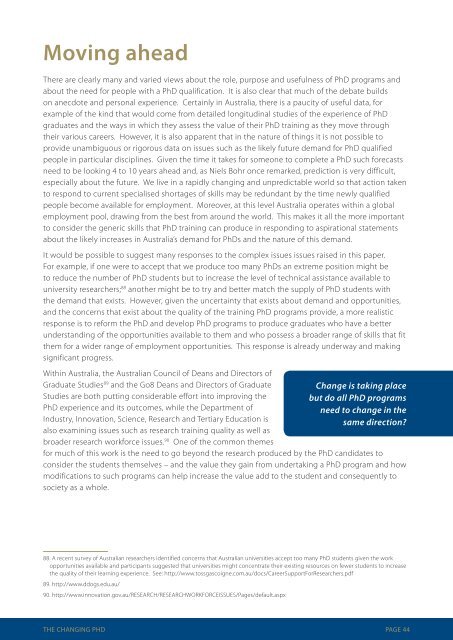the-changing-phd_final
the-changing-phd_final
the-changing-phd_final
Create successful ePaper yourself
Turn your PDF publications into a flip-book with our unique Google optimized e-Paper software.
Moving ahead<br />
There are clearly many and varied views about <strong>the</strong> role, purpose and usefulness of PhD programs and<br />
about <strong>the</strong> need for people with a PhD qualification. It is also clear that much of <strong>the</strong> debate builds<br />
on anecdote and personal experience. Certainly in Australia, <strong>the</strong>re is a paucity of useful data, for<br />
example of <strong>the</strong> kind that would come from detailed longitudinal studies of <strong>the</strong> experience of PhD<br />
graduates and <strong>the</strong> ways in which <strong>the</strong>y assess <strong>the</strong> value of <strong>the</strong>ir PhD training as <strong>the</strong>y move through<br />
<strong>the</strong>ir various careers. However, it is also apparent that in <strong>the</strong> nature of things it is not possible to<br />
provide unambiguous or rigorous data on issues such as <strong>the</strong> likely future demand for PhD qualified<br />
people in particular disciplines. Given <strong>the</strong> time it takes for someone to complete a PhD such forecasts<br />
need to be looking 4 to 10 years ahead and, as Niels Bohr once remarked, prediction is very difficult,<br />
especially about <strong>the</strong> future. We live in a rapidly <strong>changing</strong> and unpredictable world so that action taken<br />
to respond to current specialised shortages of skills may be redundant by <strong>the</strong> time newly qualified<br />
people become available for employment. Moreover, at this level Australia operates within a global<br />
employment pool, drawing from <strong>the</strong> best from around <strong>the</strong> world. This makes it all <strong>the</strong> more important<br />
to consider <strong>the</strong> generic skills that PhD training can produce in responding to aspirational statements<br />
about <strong>the</strong> likely increases in Australia’s demand for PhDs and <strong>the</strong> nature of this demand.<br />
It would be possible to suggest many responses to <strong>the</strong> complex issues issues raised in this paper.<br />
For example, if one were to accept that we produce too many PhDs an extreme position might be<br />
to reduce <strong>the</strong> number of PhD students but to increase <strong>the</strong> level of technical assistance available to<br />
university researchers; 88 ano<strong>the</strong>r might be to try and better match <strong>the</strong> supply of PhD students with<br />
<strong>the</strong> demand that exists. However, given <strong>the</strong> uncertainty that exists about demand and opportunities,<br />
and <strong>the</strong> concerns that exist about <strong>the</strong> quality of <strong>the</strong> training PhD programs provide, a more realistic<br />
response is to reform <strong>the</strong> PhD and develop PhD programs to produce graduates who have a better<br />
understanding of <strong>the</strong> opportunities available to <strong>the</strong>m and who possess a broader range of skills that fit<br />
<strong>the</strong>m for a wider range of employment opportunities. This response is already underway and making<br />
significant progress.<br />
Within Australia, <strong>the</strong> Australian Council of Deans and Directors of<br />
Graduate Studies 89 and <strong>the</strong> Go8 Deans and Directors of Graduate<br />
Change is taking place<br />
Studies are both putting considerable effort into improving <strong>the</strong><br />
but do all PhD programs<br />
PhD experience and its outcomes, while <strong>the</strong> Department of<br />
need to change in <strong>the</strong><br />
Industry, Innovation, Science, Research and Tertiary Education is<br />
same direction?<br />
also examining issues such as research training quality as well as<br />
broader research workforce issues. 90 One of <strong>the</strong> common <strong>the</strong>mes<br />
for much of this work is <strong>the</strong> need to go beyond <strong>the</strong> research produced by <strong>the</strong> PhD candidates to<br />
consider <strong>the</strong> students <strong>the</strong>mselves – and <strong>the</strong> value <strong>the</strong>y gain from undertaking a PhD program and how<br />
modifications to such programs can help increase <strong>the</strong> value add to <strong>the</strong> student and consequently to<br />
society as a whole.<br />
88. A recent survey of Australian researchers identified concerns that Australian universities accept too many PhD students given <strong>the</strong> work<br />
opportunities available and participants suggested that universities might concentrate <strong>the</strong>ir existing resources on fewer students to increase<br />
<strong>the</strong> quality of <strong>the</strong>ir learning experience. See: http://www.tossgascoigne.com.au/docs/CareerSupportForResearchers.pdf<br />
89. http://www.ddogs.edu.au/<br />
90. http://www.innovation.gov.au/RESEARCH/RESEARCHWORKFORCEISSUES/Pages/default.aspx<br />
THE CHANGING PHD PAGE 44


